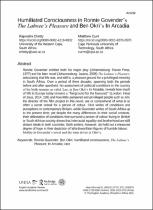Humiliated consciousness in Ronnie Govender’s The Lahnee’s pleasure and Ben Okri’s In Arcadia
Abstract
Ronnie Govender entitled both his major play (Johannesburg: Ravan Press, 1977) and his later novel (Johannesburg: Jacana, 2008) The Lahnee’s Pleasure, articulating that life was, and still is, a pleasure ground for a privileged minority in South Africa. Over a period of three decades, spanning both the periods before and after apartheid, his assessment of political conditions in the country of his birth remains as valid. Lao, in Ben Okri’s In Arcadia, reveals how much of life in Europe today remains a “fairground for the favoured” (London: Head of Zeus, 2014, 108) and how little pampered and privileged people such as Jim, the director of the film project in this novel, see or comprehend of what is so often a secret ordeal for a person of colour. Okri writes of conditions and perceptions in contemporary Britain, while Govender writes of South Africa up to the present time; yet despite the many differences in their social contexts, their delineation of conditions that surround a person of colour living in British or South African society shows that interracial equality and brotherhood are still distant ideals in both countries. Both writers, however, do hold out a measured degree of hope in their depiction of Wordsworthian figures of humble labour: Mothie in Govender’s novel and the train driver in Okri’s.

